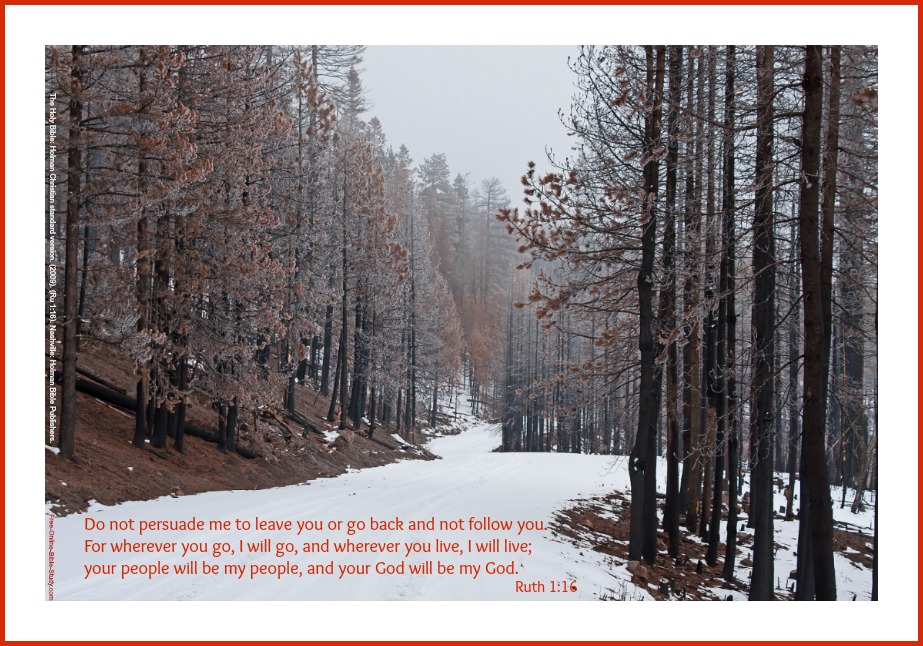- Bible Study Lessons
- Ruth
- Ruth Chapter 1
Ruth Chapter 1
Learn in this Bible study of the Book of Ruth Chapter 1 about Elimelech, his wife Naomi, and their tragedy. See how God moves through a Moabite woman named Ruth.
We pray this Bible study of Ruth is a blessing to you.
Daily Study Questions
Day One
1. Elimelech departed Judah to go to Moab because there was a famine in Judah. From reading the following Scriptures, why do you think there may have been a famine?
2. Where is the country of Moab in relation to Judah and why do you think there was no famine there as there was in Judah?
Note: You might refer to a Bible Atlas or your Bible for a map if you need one (many Bibles have maps - typically in the back of the Bible).
Day Two
3. Read Deuteronomy 23:3-6. In light of these scriptures, what do you think Elimelech’s decision to go to Moab?
4. Based on your review of Genesis 19:30-38, who was the father and mother of Moab, the first Moabite? Also, how are Naomi and the mother of Moab similar?
5. What can you determine about Ruth and Orpah from Ruth Chapter 1, verses 8, 14-17?
Day Three
6. There is a fundamental difference in the decisions of Orpah and Ruth from reading Ruth Chapter 1 verses 15 and 16. What is that difference?
7. Orpah was concerned for herself more than for Naomi but Ruth was more concerned for Naomi than for herself. With what we know about the spiritual choices each made, how does this insight affect your future choices?
8. Based on a review of Ruth Chapter 1 verses 13, 20, and 21, how did Naomi view the cause of her troubling circumstances?
Day Four
9. Why would Naomi tell the women of Bethlehem not to call her Naomi and to call her Mara instead?
10. Based on your reading of Ruth Chapter 1, what do you think may have been a reason for God’s “bitter treatment” of Naomi (assuming her circumstances were in fact the result of God’s judgment)?
11. Have you tried to fix problems in your life using your own methods, talents, and schemes; and then in hindsight seen how only God could have fixed your problem?
Day Five
12. Here’s some background information from a book titled Illustrated Manners and Customs of the Bible on the significance of the death of a husband in biblical times. It helps us understand the context of the story for this Ruth Bible study.
The death of a husband always has far reaching consequences for his family. The people of biblical times were no exception. After a period of mourning, the widowed wife might follow several courses of action.
If she was childless, she was expected to continue living with her husband’s family, according to levirate law (Deuteronomy 25:5-10). She was to marry one of her husband’s brothers or a near kinsman. If these men were not available, she was free to marry outside the clan (see verse 9).
Widows with children had other options open to them. From the deuterocanonical Book of Tobit we learn that some moved back to the family of their father or brother (Tobit 1:8). If the widow were elderly one of her sons might care for her. If she had become financially secure, she might live alone. For example, Judith neither nor moved into the home of a relative, for “her husband Manasses had left her gold, and silver, and menservants and maidservants, and cattle, and lands; and she remained upon this estate (Judith 8:7).”
Occasionally a widow was penniless and had no male relative to depend on. Such women faced great hardships (cf. 1 Kings 17:8-15; 2 Kings 4:1-7).
From: J.I. Packer and M.C. Tenney, Illustrated Manners and Customs of the Bible, Thomas Nelson, 1980, p 418.
As you can see having a husband to produce an heir was a big issue in the culture of the Old Testament in which this story takes place. Find two verses from Ruth Chapter 1 that reflect this.
13. How can we be faithful to people like Ruth is to Naomi?
14. What can we learn about the character of God from the following verses from Ruth Chapter 1?
- Verse 6
- Verses 8-9
- Verse 16
- Verse 17
Day Six
15. What influence have you made in someone’s life like Naomi made in Ruth’s life? Do you point others to God?
16. What spoke to you the most so far in this Ruth Bible study?
